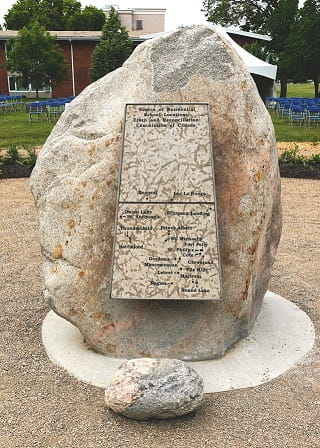Released on June 21, 2022
The Memorial Fulfills the Truth and Reconciliation Commission's Call to Action #82
Today on National Indigenous Peoples Day, the Government of Saskatchewan and the Lieutenant Governor of Saskatchewan dedicated the Saskatchewan Residential School Memorial on the grounds of Government House in Regina.
"The path to healing and meaningful reconciliation in Saskatchewan continues as we unveil the provinces Residential School Memorial," Minister Responsible for first Nations, Métis and Northern Affairs Don McMorris said on behalf of Premier Scott Moe. "This tranquil space at Government House, is now open to the community. We gather here to pay our respects and never forget the tragic past. May it provide healing through education, reflection, and conversations. We honour those whose lives were lost in Residential Schools: the survivors and their families."
Elders and survivors were involved in every step of the construction and development process, in order to honour traditional practices.

"I deeply appreciate the discussions I have had with Elders, knowledge keepers, survivors and their families," Lieutenant Governor Russ Mirasty said. "The memorial's design is entirely based on these discussions, and we have taken care to respect traditional protocols throughout the process. The memorial is more than the physical elements. It is a spiritual place where survivors and families can honour the children, and where our community can come together to learn and heal."
The memorial is composed of all natural elements, acknowledges the earth, and symbolizes the circle of life. A large central stone, selected by the Lieutenant Governor from Treaty 4 Territory, depicts the province and the locations of each former residential school. A smudge stone is installed in front for ceremonial purposes.
The memorial incorporates elements from around Saskatchewan that are symbolic and encourage healing including: traditional plants and trees, benches constructed from reclaimed wood from Wascana Centre and placed in the four cardinal directions, and four pathways leading north-to-south and east-to-west.
The construction of a permanent memorial also fulfills the Truth and Reconciliation Commission's (TRC) Call to Action #82, which recommends installing a publicly accessible, highly visible, residential school memorial in each capital city to honour survivors and all the children who were lost to their families and communities.
The residential school system operated in Canada for more than a century. The federal government reports that 150,000 Indigenous children were removed and separated from their families and communities to attend these schools. The TRC estimates that approximately twenty federal residential schools operated in Saskatchewan from the 1880s to the 1990s.
-30-
For more information, contact:
Kerri Ward-Davis
Government Relations
Regina
Phone: 306-787-8544
Email: kerri.warddavis@gov.sk.ca
Cell: 306-520-8404
Donna Boyle
Office of the Lieutenant Governor
Regina
Phone: 306-787-6460
Email: donna.boyle@gov.sk.ca

